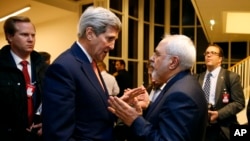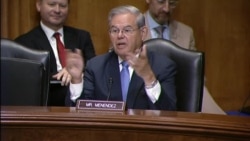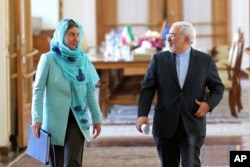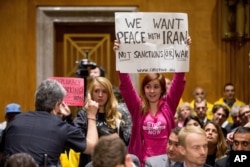As the Iran nuclear agreement heads into its second year, critics are questioning whether world powers have lost leverage in their efforts to deter Tehran from pursuing destabilizing activities in the region and violating human rights.
One year ago, exhausted diplomats from Iran and six world powers emerged from meetings in Vienna with a comprehensive agreement that curbed Iran’s ability to produce a nuclear weapon in exchange for lifting stringent economic sanctions.
The pact is in effect with clear results regarding implementation of its major components, though there are persistent suspicions on both sides that the other may take advantage of the situation and not live up to its responsibilities.
There is "always potential for hiccups,” Secretary of State John Kerry said Thursday in Paris, but “this multilateral, complicated negotiation has produced a result which makes the region less volatile” and makes the world “safer.”
President Barack Obama called the pact a success, saying, "All of Iran's pathways to a nuclear weapon remain closed." He said the deal, implemented in January, had pushed the time frame for Iran to develop a nuclear weapon if it violated the agreement from two or three months to "about a year."
WATCH: Senator Menendez questions Mark Dubowitz on adherence
U.S. opponents say the deal, however, has not deterred Iran from pursuing missile activities, sponsoring terrorism, violating human rights and harassing U.S. naval ships in the Persian Gulf, although these activities are outside the parameters of the agreement, known as the Joint Comprehensive Plan of Action.
“Over the past year, American deterrence has been severely degraded because the Iranians don’t believe that we are willing to use non-nuclear sanctions to respond to their malign activities,” said Mark Dubowitz, executive director of the Foundation for Defense of Democracies, a terrorism research group, adding that Iranian leaders “have actually probably accelerated their efforts to destabilize the region.”
“The most important thing,” Dubowitz told U.S. lawmakers Thursday at a Senate Foreign Relations Committee hearing, “is re-establish American deterrence.”
'Much worse' today
Senator James Risch, an Idaho Republican, said during the same hearing “it is a much worse deal today,” adding that "Iran is continuing to do the wrong thing," such as launching ballistic missile tests.
Various reports, quoting German intelligence, indicated Iran was thought to have made clandestine attempts to acquire material that could be used for nuclear arms development after the agreement.
While acknowledging “little trust” between Washington and Tehran, a top U.S. diplomat expressed confidence the implementation of the deal would move forward.
Ambassador Stephen Mull, the State Department's lead coordinator for Iran nuclear implementation, told VOA's Persian service, "I’m confident that if we keep on the same track we are on now, when the new president and her or his team take office in January, we’ll be able to brief them that this is a deal that’s working for American interests.”
Some U.S. lawmakers have attempted to block a tentative agreement by the U.S.-based Boeing aerospace company to sell 80 passenger jets to Iran’s government-owned airline, Iran Air. Congress is concerned about a potential multibillion-dollar deal with Iran at a time when the country has been complicit in weapons proliferation.
U.S. lawmakers opposed to the Boeing deal introduced amendments to a financial services spending bill that would prevent the Treasury Department from granting export licenses for commercial aircraft, as well as parts or services.
The State Department, which won't comment on legislation that has not been passed, had said Washington was committed to “licensed sales of civil passenger aircraft” to Iran.
The Iran nuclear deal “provides an opening for civil aviation companies, including American companies, to pursue legitimate commerce with Iran,” said spokesman John Kirby, adding that Iran’s progress in the aviation sector was good for both the economy and for public safety.
VOA's Chris Hannas contributed to this report.








